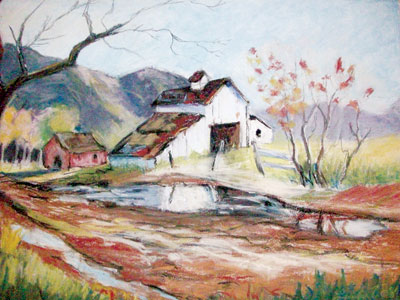All Nonfiction
- Bullying
- Books
- Academic
- Author Interviews
- Celebrity interviews
- College Articles
- College Essays
- Educator of the Year
- Heroes
- Interviews
- Memoir
- Personal Experience
- Sports
- Travel & Culture
All Opinions
- Bullying
- Current Events / Politics
- Discrimination
- Drugs / Alcohol / Smoking
- Entertainment / Celebrities
- Environment
- Love / Relationships
- Movies / Music / TV
- Pop Culture / Trends
- School / College
- Social Issues / Civics
- Spirituality / Religion
- Sports / Hobbies
All Hot Topics
- Bullying
- Community Service
- Environment
- Health
- Letters to the Editor
- Pride & Prejudice
- What Matters
- Back
Summer Guide
- Program Links
- Program Reviews
- Back
College Guide
- College Links
- College Reviews
- College Essays
- College Articles
- Back
The Impact of Loneliness and Alienation in "Of Mice And Men"
In the novel Of Mice And Men, Crooks and George suffer from loneliness and alienation. The characters are lonely because they have something unusual about them that alienates them from being what is considered normal in society. Cooks struggles because of his race and George struggles because he always looks out and cares for Lennie.
Crooks's loneliness is shown right when we meet him. Crooks lives apart from the rest of the workers and is housed in a secluded area. Crooks lives in a small shed and does not have a proper bed to sleep on. It is clear that he is pushed away and not thought of very much. While other ranch workers of OMAM live in quarters, Crooks lives separately in a small shed on the side of the barn and uses a box filled with hay as a substitute for a bed. This is because he is black, while the rest of the workers are white. Physically isolated from the other workers, Crooks does not have many friends, nor do people communicate with him very much. Because of this, Crooks tries to establish the shed as his own and exclude others as they exclude him, telling Lennie, "You got no right to come in my room. This here's my room. Nobody got any right in here, but me" (Steinbeck 68) after Lennie comes to visit him in his shed room.
Additionally, Crooks' loneliness is again visible when the other hands on the ranch do not interact with him outside of work because of his skin color. When the other hands are playing cards and dice, they do not invite Crooks. After constantly being excluded from every activity, Crooks becomes bitter and does his part to stay away from people and do his work. Crooks discusses how this makes him feel with Lennie, saying, “a guy needs somebody? to be near him. A guy goes nuts if he ain't got nobody. Don't make no difference who the guy is, long's he's with you. I tell ya. I tell ya a guy gets too lonely an' he gets sick” (Steinbeck 72-73). Crooks ends up uneasy and mean because of being neglected and rejected by the other farm members.
George also suffers from loneliness, though it might not come to the reader at first glance. George spends most of his time helping and caring for Lennie, who is mentally disabled. Because Lennie does not fit in with the group, George doesn’t fit in either. Slim says to George, “It jus’ seems kinda funny a cuckoo like him and a smart little guy like you travelin’ together” (Stein beck 20). The group’s view of Lennie has an impact on George. Although George fits in, Lennie cannot, and so, George ends up feeling socially isolated and weighed down.
George also struggles to connect with the other workers because of his responsibility to Lennie. Although George cares for Lennie, being with him is stressful and tiring. Lennie almost always makes them lose their job, and they keep hopping around. George cannot maintain friendships and often struggles to make new ones. George confides to Slim that this responsibility weighs heavy on him, saying,“ ’Course Lennie’s a God damn nuisance most of the time… But you get used to goin’ around with a guy an’ you can’t get rid of him”(Steinbeck 20). George cares deeply about Lennie, but this comes with a big responsibility to care for and keep Lennie out of trouble. George struggles with keeping Lennie out of trouble as Lennie has the mind of a child. Therefore, Lennie makes mistakes that end up stressful and challenging for George to fix, even though he is not fully aware of the impact of what he has done.
Everybody struggles with loneliness and alienation at some point in life, just like George and Crooks in Of Mice And Men. It is how one deals with it that is important because each individual's inner strength and ability to cope with the situation at hand or work to change the problematic situation will determine their ability to move beyond the feelings of loneliness and alienation to find inner happiness.

Similar Articles
JOIN THE DISCUSSION
This article has 0 comments.
